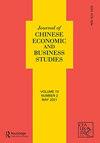Ethnic spatial dispersion and immigrant identity*
IF 3.7
Q2 ECONOMICS
Journal of Chinese Economic and Business Studies
Pub Date : 2023-06-06
DOI:10.1080/14765284.2023.2220271
引用次数: 1
Abstract
The role of ethnic clustering in ethnic identity formation has remained unexplored, mainly due to missing detailed data. This study closes the knowledge gap for Germany by employing a unique combination of datasets, the survey data from the German Socio-Economic Panel and disaggregated information at low geographical levels from the last two but still unexploited full German censuses, 1970 and 1987. Utilizing the exogenous placement of immigrants during the recruitment era in the 1960s and 1970s we find that local co-ethnic concentration affects immigrants’ ethnic identity. While residential ethnic clustering strengthens immigrants’ retention of an affiliation with their origin (minority identity), it weakens identification with the host society (majority identity). The effects are nonlinear and become significant only at relatively high levels of co-ethnic concentration for the minority identity and at very low levels of local concentration for the majority identity. The findings are robust to an instrumental variable approach.族群空间分散与移民认同*
族群聚集在族群认同形成中的作用仍未被探索,主要是由于缺乏详细的数据。这项研究通过采用独特的数据集组合、德国社会经济小组的调查数据和1970年和1987年最后两次但仍未利用的德国全面人口普查在低地理水平上的分类信息,缩小了德国的知识差距。利用20世纪60年代和70年代招工时期移民的外生安置,我们发现地方共族集中影响移民的族群认同。虽然居住的族群聚集加强了移民对其原籍国的归属感(少数民族认同),但它削弱了对东道国社会的认同(多数民族认同)。这种影响是非线性的,只有在少数民族身份相对较高的共同民族集中水平和多数民族身份非常低的地方集中水平时才会变得显著。这些发现对于工具变量方法是稳健的。
本文章由计算机程序翻译,如有差异,请以英文原文为准。
求助全文
约1分钟内获得全文
求助全文

 求助内容:
求助内容: 应助结果提醒方式:
应助结果提醒方式:


